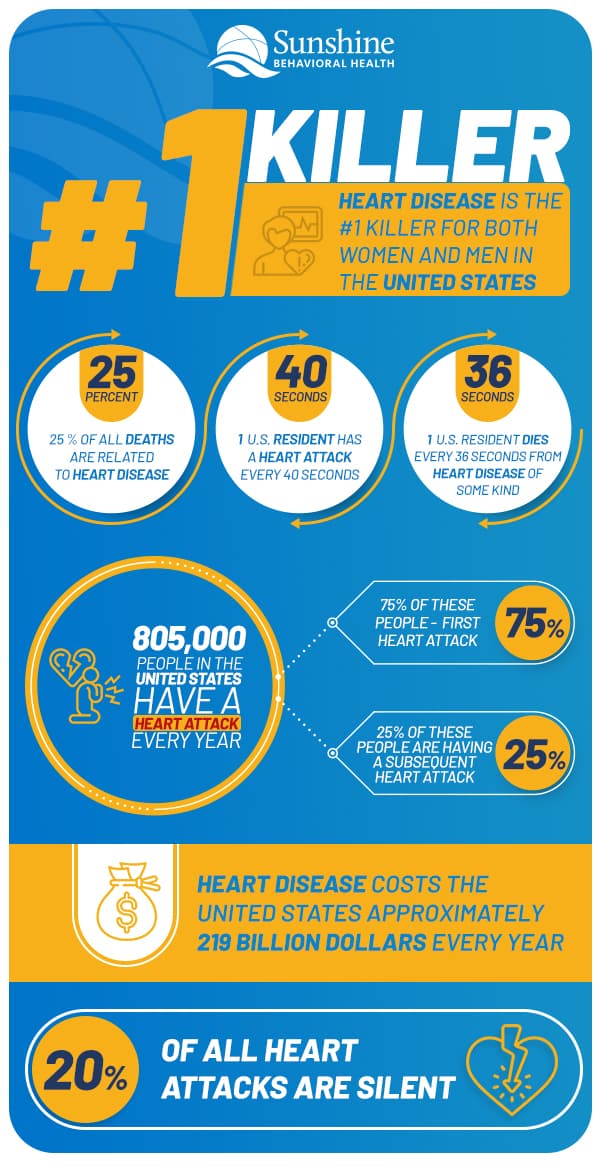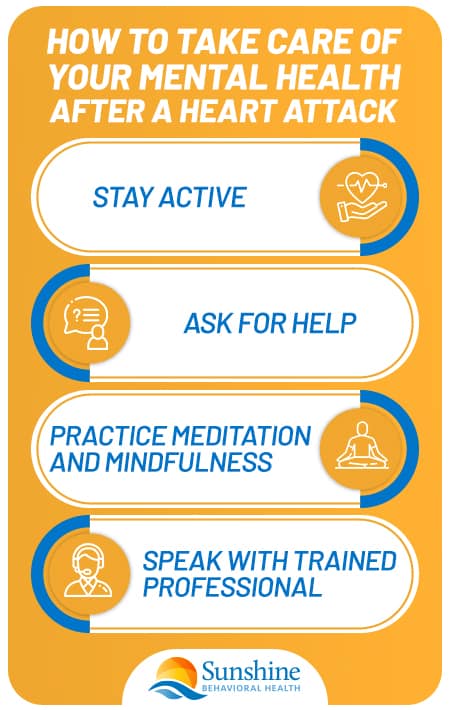When people think about their health, they usually think about their physical health. This could include their skin, their heart, their lungs, and their brain. At the same time, mental health is also a critically important part of someone’s overall health.
Therefore, it’s important for people to address physical health as well as their mental health, as the two are closely related. One of the most common chronic medical conditions is heart disease.
Heart disease is far more common than many people realize. Even though extensive research has produced new diagnostic and treatment options, many people still have heart attacks. A few relevant statistics from the Centers for Disease Control and Prevention (CDC) include:
- Heart disease is the most prevalent cause of death for both women and men in the United States.
- One U.S. resident has a heart attack every 40 seconds and one dies every 36 seconds from heart disease of some kind.
- Approximately 805,000 people in the United States have a heart attack every year. For approximately 75 percent of these people, it’s their first heart attack, which means 25 percent of these people are having a subsequent heart attack.
- About 25 percent of all deaths are related to heart disease.
- Heart disease costs the United States approximately 219 billion dollars every year.
- Around 20 percent of all heart attacks are silent. This means that they cause damage to the heart, but people may not realize it.
Clearly, heart attacks are common yet deadly. It’s important for everyone to learn more about heart attacks, including how they relate to mental health. What do people need to know?

What Mental Health Disorders Are Related to Heart Disease?
Numerous mental health disorders are closely related to heart disease and heart attacks. This means that some people who have had heart attacks may face greater risks of developing one of these conditions.
It can also mean that people who have been diagnosed with mental health conditions may face greater risks for heart attacks.
There are several mental health disorders that are closely related to heart disease. They include:
Mood Disorders
Mood disorders are closely tied to heart disease. Examples of common mood disorders include depression and bipolar disorder. With these conditions, mood frequently impacts people’s psychological and mental well-being.
During manic episodes that are common to bipolar disorder, people may be at risk of engaging in dangerous activities. Or, if they’re depressed, they may have a hard time finding the motivation to exercise. Both scenarios may increase their chances of having heart attacks.
Furthermore, people who have suffered heart attacks in the past might not be able to engage in certain physical activities or might be nervous about doing so. Not being able to exercise might elevate their risks of developing depression.
Anxiety Disorders
Specific situations that could lead to fear, dread, and terror when someone suffers from an anxiety disorder. Specifically, some people may develop panic disorder, which can lead to chest pain that may closely mimic a heart attack.
Similar types of pain can make it difficult for people to differentiate between an acute anxiety attack and a heart attack. In addition, people who have had heart attacks may be at risk of developing anxiety because they are worried about suffering another one.
Chronic Stress
Chronic stress has been well documented to increase someone’s risk of suffering a heart attack. Even though chronic stress itself may not be specifically diagnosed as a mental health condition, it is something that is incredibly common.
Stress comes in many shapes and forms. Some people experience emotional stress while other people encounter financial stress. When people face chronic stress, their bodies work hard.
Their bodies release cytokines that can elevate their blood pressure. Individuals with high blood pressure are at a greater risk of suffering a heart attack.
In addition, people who have suffered a heart attack in the past may be under a greater amount of stress because they are worried about suffering another one.
Post-Traumatic Stress Disorder (PTSD)
After having heart attacks, people may have bad memories of their experiences. They might be at risk of developing post-traumatic stress disorder (PTSD). One study found that about 15 percent of people who have heart attacks might develop PTSD.
Survivors of stressful experiences may have been diagnosed with PTSD, which could boost the risks of a heart attack.
Such findings indicate the close link between mental health issues and heart attacks. People who survive heart attacks should be aware of how their cardiac conditions could impact their mental health.
Substance Use Disorder as a Mental Health Issue: Heart Risks
When people experience substance use disorder or addiction, they also face higher risks of having heart attacks. Serious addiction-related health concerns could lead to acute coronary episodes. Specifically, substances such as cocaine can cause heart attacks and other cardiac problems.
Cocaine is a potent stimulant. It causes various effects. It targets the central nervous system, causing a sensation known as a high, a feeling of extreme happiness and reduced worry. Cocaine can also dramatically increase someone’s blood pressure.
Increases of blood pressure and heart rate can disrupt the heart’s electrical signals. When the heart’s electrical signals are disrupted, a heart attack can occur.
As dangerous as it is, cocaine is not the only substance that can cause heart attacks, but it’s one of the most common, according to a study published in 2014. This study reported that most people who received emergency care due to cocaine use also experienced cardiac issues.
A Heart Attack Can Contribute to Mental Health Issues
 Mental health issues are common among people who survive heart attacks. Multiple studies indicate that a significant number of people who have had heart attacks or other cardiac incidents are at risk of developing anxiety or depression afterward.
Mental health issues are common among people who survive heart attacks. Multiple studies indicate that a significant number of people who have had heart attacks or other cardiac incidents are at risk of developing anxiety or depression afterward.
Following heart attacks or other incidents, many people stay in the intensive care units (ICUs) of hospitals. Even if they walk out of the ICU alive — and some don’t — they may still have to deal with various consequences.
The sudden nature of some heart attacks might boost the risks of PTSD. People may be going about their normal day, but in a matter of moments, may find themselves in pain and in a hospital. This abrupt change is one reason why people with heart attacks are at risk of developing PTSD and other psychological conditions.
Other medical conditions, such as cancer, are more chronic. People may have more time to assess what’s occurring, although they may still obviously experience various psychological disorders related to their physical conditions.
Heart attacks might be more of a surprise and developments might occur more suddenly. People might find it difficult to adjust so quickly, which could lead to new mental health issues or intensify existing ones.
A Heart Attack Can Be Psychologically Damaging
A heart attack can also be damaging psychologically. Many people take great pride in their bodies. They work hard to stay in good shape, eat right, and enjoy a relatively high quality of life.
Even though poor diets and sedentary lifestyles can increase people’s risk of cardiac problems, there are people who are otherwise healthy who might be at risk of suffering heart attacks as well. They may have genetic conditions that predispose them to acute coronary events or other complications.
When health-conscious people have heart attacks, they may be wondering what else they can do. If they make changes to improve their health, they may have a hard time adjusting to their new normal.
A Heart Attack Can Lead to Depression
Because people may have a difficult time adjusting to a new normal, they could be at risk of developing depression. They may not realize that heart attacks could limit their physical capabilities.
The heart is responsible for pumping blood to the rest of the body. After a heart attack, the heart may have a difficult time meeting these demands. People might not be able to run as fast, they might not be able to run as far, and they might not be able to enjoy the activities they once found enjoyable.
Without the ability to engage in these activities, people might be searching, wondering what to do next. As they spend a lot of time wondering what they can do, they might realize that their lives could be changed forever.
Realizing such changes can lead to depression, so people who have had heart attacks should take care of their mental health as well.
Who Could Develop Mental Health Issues Following a Heart Attack?
Mental health and heart attacks go hand in hand. Examining who might have heart attacks and develop mental health issues could be useful. People at greater risk of developing mental health issues following a heart attack include individuals who:
- Have a pre-existing history of anxiety and/or depression and may be at greater risk of suffering acute episodes of anxiety and depression after an acute coronary event.
- Live alone and are at a greater risk of developing mental health issues following a heart attack.
- Struggle to pay their medical bills who face a greater risk of developing anxiety or depression.
- Experience a wide variety of other chronic health concerns, such as obesity and diabetes, so are also at a greater risk of suffering mental health issues.
- Are under the age of 55 and have a heart attack or other incident and also face greater risks of developing mental health issues.
Anyone is capable of developing serious mental health concerns following a heart attack; however, people in one or more of these categories are at a greater risk of developing mental health issues. Following a heart attack, it’s vital for everyone to ensure that they receive the physical and mental health assistance they need.
How to Take Care of Your Mental Health After a Heart Attack
If you have recently had a heart attack, you may have several questions about what’s going to happen next. This uncertainty can cause or worsen mental health issues. So taking care of your mental health is key. A few tips include:
- Stay active: Talk to your doctor. See what type of physical activity you can perform safely. Then, make sure you remain active. Exercise releases endorphins, which can improve your mood. If you take care of your physical health, you can take care of your mental health as well.
- Ask for help: After a heart attack, you might find that it takes longer to perform certain tasks. You should also reduce your level of stress. Consider asking family members and friends for help when you need it.
- Practice meditation and mindfulness: After a heart attack, you may have many thoughts racing through your head but want to keep them organized. That is where meditation and mindfulness can be helpful. Meditating regularly might help you cope with uncertainty surrounding your heart attack and overall health.
- Speak with trained professionals: Speaking with trained professionals might help you identify the signs and symptoms of mental health issues before they take over your life. Mental health professionals have a wide variety of therapeutic tactics they can use to help you address your mental and physical needs.
While people might want to know if they’re going to suffer another heart attack, it’s impossible to predict the future. But if you take care of your mental health, you can take care of your physical health as well. Such efforts can make a significant difference in your quality of life.
Sources
Medical disclaimer:
Sunshine Behavioral Health strives to help people who are facing substance abuse, addiction, mental health disorders, or a combination of these conditions. It does this by providing compassionate care and evidence-based content that addresses health, treatment, and recovery.
Licensed medical professionals review material we publish on our site. The material is not a substitute for qualified medical diagnoses, treatment, or advice. It should not be used to replace the suggestions of your personal physician or other health care professionals.






